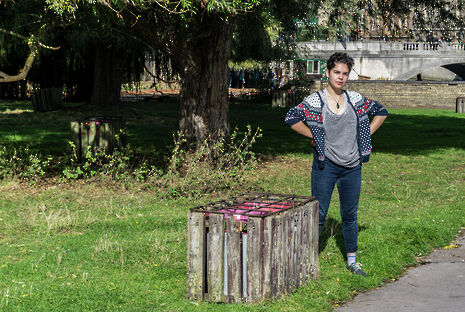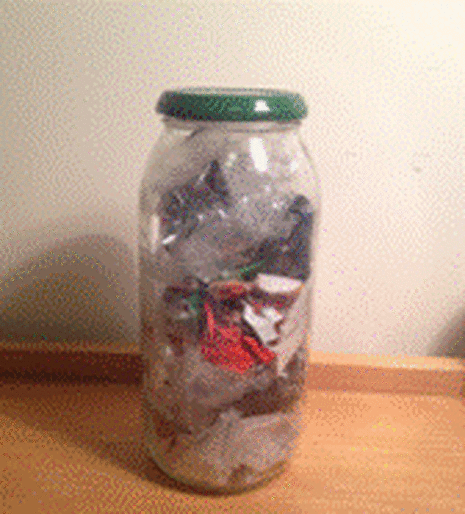Trash Talk, epsiode six: Clearing up
Kate Emden reflects on her eight weeks of living the zero-waste life

It is done! The experiment has run its course! For the past eight weeks I have been attempting to go zero-waste as a student in Cambridge and now I need arbitrarily do so no more. But I have two confessions: I definitely failed. And I am not going to stop.

My failure is demonstrated by the Jar of Shame.
This jar, in which I have kept all of the waste I have been unable to recycle or compost, started small. Rowing tape and the plastic windows on envelopes I received. But as term progressed and my resolve fluctuated, a few more avoidable items made their way in. It’s actually turned out to be a slightly weird sedimentary time capsule of my term. You can tell when it was week five by the chocolate bar wrappers.
Nonetheless, I’ve definitely reduced my waste output, not least by actually taking the time to put things in the right bins, and separate the recyclable bits of packaging from the non-recyclable bits. And I’ve learned a thing or two about how to keep your general waste output down. Some of these points are repeated from previous articles, but this is the concise list of things you can (and should) do to reduce your waste with basically no effort.
Just don’t buy new long-term plastic goods
Whether that’s kitchenware, shoes, watches, vases, toiletry bags or ornamental flamingos. There are almost always glass, metal or fabric alternatives to any product, which are often better quality as well. We need to think long-term about what we own, and what’s going to happen to it at the end of its usage. Let’s engage in a little consumer responsibility. Or if you have to buy plastic, see if you can get it second-hand. Or just buy second-hand anyway. We do not need more stuff in the world. (Also, plastic looks tacky, just saying.)
It is so easy to go zero-waste on toiletries
This required so little effort I can’t even. Also using coconut oil as a moisturiser has made my face *ludicrously* soft. *Ludicrously*. And it’s so much cheaper. There’s literally no reason not to do this, please do this. Okay, maybe there are medical reasons, but if you don’t have medical reasons then you literally have no reason not to do this. Please do this.
Refuse packaging in shops
No straws, unwanted napkins, or unnecessary food packaging. The people at the falafel van may have raised an eyebrow when I asked for my wrap without the paper bag but we will see who is laughing when the world is one massive landfill and the oceans are a toilet of plastic. (None of us, probably.)
Also fun top tip: if you end up with a napkin anyway, just keep it for later actual use. For example, as toilet paper. FUN.
Don’t produce any food waste
Okay, so this one is maybe easier for those who have composts in college or frequent Sidgwick Site (where there is a compost bin in the buttery). But if you do have access to a composting facility then *use it*. You and the planet will feel good about it. Not to brag (but definitely to brag), the one thing I’ve been consistent on is this: I haven’t sent any food to landfill in 8 weeks. And that is something that is so easy to keep up.
Also, if they don’t already, maybe suggest that your college or faculty provide food bins? It doesn’t hurt to ask.
The main thing that I found difficult was grocery packaging. This is mostly because I’m a lazy bum who doesn’t know how to cook. But even there, it’s pretty easy to find stuff that comes in recyclable packaging. And packaging-free shops if you live near one (it’s worth a google) are incredibly useful for this. This is where producer responsibility comes in big time.
Companies need to be held responsible for the environmental impact of what they’re producing. But at the moment it’s easier and cheaper for them to produce things covered in plastic, letting somebody else take on the responsibility and financial burden of disposal. Nobody is currently holding them accountable for this.
There are things that we can (and should) do at the consumer level to reduce our communal waste production. But certain areas of reduction, for example food packaging, require infrastructural change. We can facilitate this by raising awareness, signing petitions, returning unwanted packaging after use, and supporting businesses that are holding themselves responsible. Government policy obviously plays a huge role in this. Just consider the microbead ban in the UK or the recent (and incredibly exciting) French ban on non-compostable plastic cups, plates and cutlery.
However, the point of this column has been to find out how easily we can individually reduce our waste on a day-to-day basis. It turns out the answer is: very easily. It would require minimal effort on all our parts to change our communal approach to trash. And the change will come. Just like we came round to turning off the tap when we brush our teeth and turning off lights when we aren’t in the room. But I, for one, would like it to come sooner rather than later
 Features / Should I stay or should I go? Cambridge students and alumni reflect on how their memories stay with them15 December 2025
Features / Should I stay or should I go? Cambridge students and alumni reflect on how their memories stay with them15 December 2025 News / Dons warn PM about Vet School closure16 December 2025
News / Dons warn PM about Vet School closure16 December 2025 News / Cambridge study finds students learn better with notes than AI13 December 2025
News / Cambridge study finds students learn better with notes than AI13 December 2025 News / SU reluctantly registers controversial women’s soc18 December 2025
News / SU reluctantly registers controversial women’s soc18 December 2025 News / News In Brief: Michaelmas marriages, monogamous mammals, and messaging manipulation15 December 2025
News / News In Brief: Michaelmas marriages, monogamous mammals, and messaging manipulation15 December 2025








